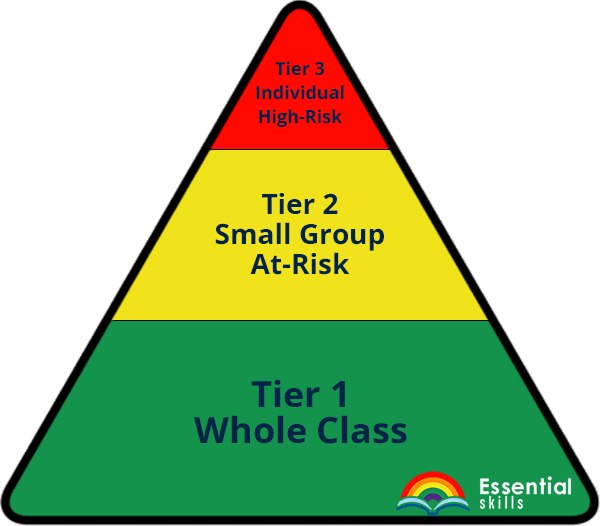
The Response to Intervention (RTI) is a multi-layered instructional and academic support approach, most effective for learners who find comprehension challenging. While math and reading intervention programs are frequently utilized in elementary schooling, the RTI method can also be extended to behavioral interventions. The prevalence of middle school reading intervention programs and those designed for high school students attests to the widespread adoption of this methodology in North America.
Before applying any targeted intervention, students receive high-grade, research-based instruction. This is followed by an assessment stage, used to single out those students who may need a more focused reading intervention program. The RTI method comprises three tiers of increasing intensity, each aimed at fulfilling the diverse requirements of the students.
The first tier of the RtI reading program encompasses a universal approach to learning. Here, every student receives high-quality, research-based instruction, supplemented by an array of tools and resources with a proven track record for effectiveness. Interactive whiteboard lessons, systematic phonics instruction, high-quality educational software, printable worksheets, print or digital leveled reader books – these are all examples of research-based reading intervention programs that contribute to the success of Tier I.
Upon completion of this first level, assessments are carried out to gauge student progress and pinpoint those in need of a more targeted math or reading intervention program. Typically, Tier I shouldn't last beyond 8 weeks. Students demonstrating deficiencies in key skill areas are then advanced to Tier II of the RTI reading program. Considered at-risk, these students are transitioned into a more individualized early reading intervention program.
The second tier involves concentrated instruction for small groups, addressing areas where students require additional support. Especially at the primary level, reading intervention programs are critical, as they can significantly influence a student's learning trajectory for years to come. Although Tier II may last longer than Tier I, it's generally not stretched beyond a single academic term. To monitor student progress and the effectiveness of the RTI reading program, it is advantageous to align intervention tiers with grading periods.
Students not responding to Tier II or failing to make sufficient progress, are elevated to the final step of the RTI reading program – Tier III. This level incorporates a one-on-one, intensive intervention approach, personalizing instruction to meet each student's unique learning needs. At this stage, students are considered high-risk.
Role of Essential Skills in Strengthening Reading Capabilities

Essential Skills offers research-based reading intervention programs designed to bolster all levels of your Response to Intervention strategy. Our Integrated Assessment feature tailors instruction for each student, targeting their specific skill gaps. Based on pretest results, each learner receives a customized early reading intervention program that caters to their individual needs.
In the Tier I and II stages, our elementary reading intervention programs supplement instruction by allowing learners to progress independently, learning at their own pace within a group or classroom setting. The programs can also be incorporated with an interactive whiteboard for teacher-led lessons.
At the Tier III level, our research-based reading intervention programs provide systematic instruction in essential reading components like phonemic awareness, phonics, sight word recognition, vocabulary, and reading comprehension. These programs are intended for high-risk elementary and remedial older students. With our built-in pretests, learners receive an individualized program, ensuring intensive intervention precisely where it's most needed. Teachers can also design custom assignments for individual learners, enabling them to target specific skill areas in need of further reinforcement.
Our comprehensive online reading intervention program includes both primary and senior student themes, making Essential Skills the go-to resource for elementary and middle school reading intervention programs. The ability for students to learn independently and at their own pace, coupled with a high degree of personalization, underscores the value of Essential Skills as the preferred choice for your reading intervention program.
Essential Skills RTI reading programs provide support at every tier of the RTI framework. Our Tier I programs are designed to offer universal access to high-quality instruction, while our Tier II and Tier III interventions focus on targeted and intensive support. These RTI reading programs ensure students receive the help they need, whether through small group activities or individualized instruction. By incorporating Essential Skills programs into an RTI model, schools can effectively address student reading challenges and ensure progress across all grade levels.
What Educators Are Saying about our Reading Intervention Programs
“These programs are very effective for RTI Tier 2 and 3 students, providing lots of extra practice and repetition in the basic skills. All my students love these programs and work independently at their own level and pace. Essential Skills is like having another teacher in the room to provide individualized instruction. The reports are easy to access, and you can see at a glance how students are progressing through the skills.”
~ Susan Delaney, Resource Teacher, Sidney Lanier Elementary
“We are one of the pilot schools for our state’s RTI implementation. We received recognition at the state level for the use of Essential Skills software as a highly successful intervention strategy with our English language learners. I like the programs because they are not “gamey”, and they have a clear skill focus that guarantees the children learn the skills presented. The programs are a valuable and essential component of our school RTI.”
~ Donna Stokes, Title I Reading Specialist, Tonalea Elementary
“Ever since we started using the programs for reading intervention with our first and second grade students, we have seen that our third and fourth grade students are much more ready to learn.”
~ Brenda Hoerner, Principal & Title I Reading Teacher, Canyon Elementary
“We have been using Essential Skills programs daily for several years. We like being able to focus on specific skills that are aligned to our curriculum. The programs are great for supporting RTI Tier 2, as well as supplementing and reinforcing regular classroom instruction. Essential Skills programs are an important component of our language arts curriculum.”
~ Linda Kessler, Reading & Math Specialist, Washington Elementary
The Best Value in K–6 Learning
Access the full Essential Skills library — all subjects, all grade levels — for one simple price per class or school. Discover why thousands of educators trust our research-based programs to build foundational skills and boost student success.
See Our PricingSee measurable student gains — or your money back.
We stand behind our programs. If your students don’t show measurable progress in 6 months, we’ll refund your subscription — no questions asked.
Just use the program 2–3 times per week for 20–30 minutes per session, and track progress using our built-in reports.
We believe in results, and we’re putting that belief in writing.
